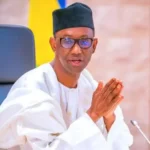Paul Ojo, a university don, has linked the myriad of security challenges in the country as a major factor in the reduced respect for the Nigerian passport.
Ojo, a lecturer in the Department of International Relations, College of Humanities, Social and Management Sciences of McPherson University, Ogun State, made this submission at a Security sensitization seminar on Thursday.
The International Relations don who is also a security expert, harped on the need for Universities to understand their roles in the security architecture of the nation.
Presenting a paper focused on campus security, Ojo stressed the importance of a peaceful nation, and the obligation of the government at all levels to ensure its provision according to the constitution. He added that failure of government has international implications, and advised authorities in tertiary institutions to safeguard their immediate environments.
- How INEC overcame insecurity, electoral violence in 2023 elections
- Why Nigeria needs decentralization – Soyinka
“Security is the stable, relatively peaceful and environment where you can predict your action without any form of harm or disturbance. This is guaranteed by the Nigerian constitution, section 14(2) of the 1999 constitution as amended that says ‘the security and welfare of the people shall be primary purpose of the government.’
“Therefore, one cannot address the problem of security without addressing our internal issues in the country.
“One of the problems our security challenges cause is dent the image of the country, and that is why the Nigerian passport has become an endangered species. Wherever anyone holds the green passport, people like to question them.
“I therefore put it to the Vice-Chancellor and his team that the security of life and property, and the welfare of staff shall be your primary responsibility.”
He added that government still goes to the media to solicit for public support despite the various security outfits in the country. This he said, is not far-fetched because the government requires citizens to obey laws, and collaboration on ensuring security.
He further described the security challenges Universities are exposed to cultism, drug abuse, sexual harassment amongst others, with the cultism and drug abuse taking the lead.
“Cultism has become a way of life from the primary to tertiary institutions in the country, so we cannot run away from it because this social vice will rear its ugly head as the University expands. But what is important is important is the ability to handle it. Also, drug abuse is everywhere, we should not deceive ourselves, it is a common issue in all universities.”
On his part, Oluwaseyi Lala, a chief superintendent of police and the Senior Security Officer of the University, stressed the potential impact lecturers can have on students towards moulding them to be better products for the society.
“No other authority holds more influence over students than academic staff who act as mentors, guardians, coach, educationist, advisers and counsellors.
“Lecturers have the pre-eminent ability to modify individuals, communities and the larger society with the words they teach. Frankly, speaking, terrorists are not born, rather they were indoctrinated. Their mindset of hatred and fanatism is the product of indoctrination and defective monitoring.”
The seminar also had in attendance Prof. Francis Igbasan the vice-chancellor of the institution, who highlighted the various efforts the Institution has put in place in conjunction with various security outfits to ensure safety on its corridors.
Others in attendance included the representatives from Nigerian Police Force, the Nigerian Army, and community vigilante group.

 Join Daily Trust WhatsApp Community For Quick Access To News and Happenings Around You.
Join Daily Trust WhatsApp Community For Quick Access To News and Happenings Around You.


